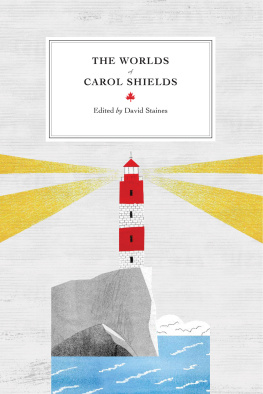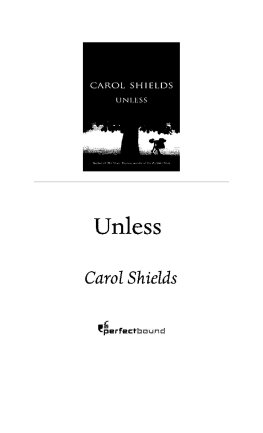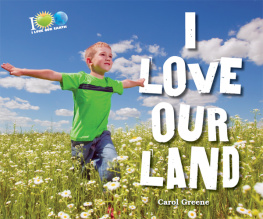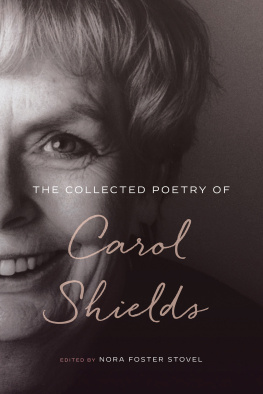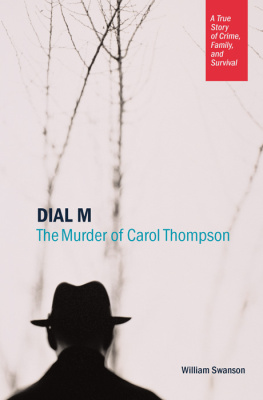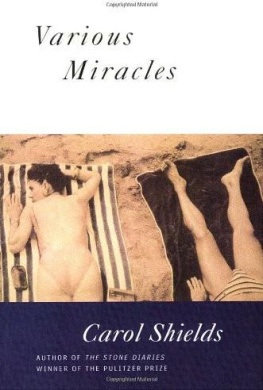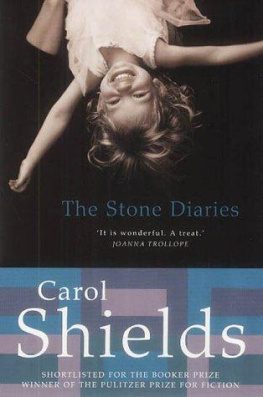


The University of Ottawa Press acknowledges with gratitude the support it receives from Heritage Canada through the Canada Book Fund and Livres Canada Books, the Canada Council for the Arts, and the Ontario Media Development Corporation (OMDC), the Canadian Federation for the Humanities and Social Sciences through the Awards to Scholarly Publications Program, and especially that of the University of Ottawa.
Copy editing: Trish OReilly-Brennan
Proofreading: Barbara Ibronyi
Typesetting: Atelier Typo-Jane and CS
Cover illustration and design: Bartosz Walczak
Library and Archives Canada Cataloguing in Publication
The worlds of Carol Shields / edited by David Staines.
Includes bibliographical references.
Issued in print and electronic formats.
ISBN 978-0-7766-2206-4 (pbk.).--ISBN 978-0-7766-2186-9 (pdf).-
ISBN 978-0-7766-2185-2 (epub)
1. Shields, Carol, 1935-2003--Criticism and interpretation. I. Staines, David, 1946-, editor
PS8587.H46Z96 2014 | C813.54 | C2014-907212-0
C2014-907213-9 |
University of Ottawa Press, 2014
Printed in Canada
To the memory of
Lorraine McMullen 19262003
Table of Contents
DAVID STAINES
MARGARET ATWOOD
ELEANOR WACHTEL
ANNE GIARDINI AND JOSEPH GIARDINI
CORAL ANN HOWELLS
ELIZABETH WATERSTON
WENDY ROY
CYNTHIA SUGARS
PATRICIA LIFE
JOHN VAN RYS
ALEX RAMON
MARGARET STEFFLER
TIM HEATH
SHELLEY BOYD
MARILYN ROSE
ELIZABETH REIMER
ARITHA VAN HERK
NORA FOSTER STOVEL
CATHERINE HOBBS
JOAN CLARK
JANE URQUHART
WAYSON CHOY
MARTIN LEVIN
T his book originated in a conference funded by the Social Sciences and Humanities Research Council of Canada. The editor gratefully acknowledges the Council and its financial support. He also acknowledges the support and cooperation of the University of Ottawa Press and its director, Lara Mainville, its acquisitions editor, Dominike Thomas, and its production editor, Elizabeth Schwaiger.
Three individuals deserve special tribute:
Zachary Abram gave exemplary dedication to the planning and execution of the conference, including his superb skills as a computer authority.
Donald Shields gave his blessing to the planning of the original conference and supported its organization.
The late Carol Shields wrote the fiction and non-fiction, the poetry and plays behind these essays. Without her, there would not be this book.
David Staines
DAVID STAINES
F or Carol Shields, novelist and short story writer, biographer and literary critic, playwright and poet, art offers a means of confronting the joys and dramas of the human condition. As she said in her seminar, A View from the Edge of the Edge, at Harvard University on February 10, 1997:
Years ago, in an introduction to a book of short fiction, the American writer Hortense Calisher talked about the short story being mainly a new world form. Reports from the frontier, she called them, a lovely and accurate phrase that caught my attention. Perhaps, I remember thinking, this is what all of literature is: a dispatch from the frontier, news from the edge. Even given that the edges and centres of society are forever shifting, it does seem to me that the view from the edge offers a privileged perspective. Also freedom from cynicism if not from anger. Also a kind of real or willed innocence which is what I believe every writer must keep alive in order to write.
And Shields knew well the problems of the edge, as she continued, for she stood at the edge, too, by virtue of gender.
Where I grew up in Oak Park, Illinois, I attended, first, Nathaniel Hawthorne Public School, and when I was a little older, Ralph Waldo Emerson Public School. I knew who these bearded, bespectacled, frockcoated gentlemen were; their portraits hung in a place of honour in our schools. They were writers. They were men. They were dead.
As Margaret Atwood observes, Possibly feminism was something she worked into, yet Shields was always aware of who she was, of her many readers both male and female, and of the power of art to give her a privileged perspective on life. Her unique voice, compassionate and forever human and humane, gave her the power to portray the worlds around her in her own wise manner.
The Worlds of Carol Shields brings together twenty-three people, some of them her friends, some of them scholars who are her readers, to shed fresh light on her many achievements. The author of ten novels, four collections of short fiction, three volumes of poetry, four published plays, one volume of literary criticism, and one biography, she carved out her special place in Canadian letters. Her many honours include the Canadian Authors Association Award for Fiction for 1976, the Arthur Ellis Award for Best Canadian Mystery, the Governor Generals Award, the National Book Critics Circle Award, the Pulitzer Prize, the Orange Prize, and the Charles Taylor Prize for Literary Non-Fiction. She is among the most honoured of all Canadian writers.
The Worlds of Carol Shields opens with four close friends, some of them relatives, of Carol Shields. For many years her admiring friend, Margaret Atwood pens an obituary which is a unique tribute to Shieldss life and career. Eleanor Wachtel divulges the history of her strong friendship with Shields, explaining its origin and its effect on her life. Then the novelist Anne Giardini, Carol Shieldss daughter, and her son Joseph use their intimate knowledge of the Shields family to stand back and examine Shieldss poetry and its thematic relationship to her fiction.
Coral Ann Howells begins the examination of Shieldss fiction. Studying her novels and her short stories as well as her biography of Jane Austen, she posits a close connection between Shieldss works and the criture fminine espoused by such feminist scholars as Hlne Cixous, uncovering the feminist directions of Shieldss writings. Elizabeth Waterston examines Small Ceremonies, the first novel of the neophyte Shields, and Wendy Roy furthers this exploration, analyzing The Box Garden as the sequel to Small Ceremonies and A Fairly Conventional Woman as the sequel to Happenstance. Exploring Swann is a question, according to Cynthia Sugars, of understanding the allure and even the necessity of literary ancestors. Patricia Life seeks the Canadian antecedents to The Stone Diaries in Shieldss indebtedness to her own literary ancestors, Ethel Wilson and Margaret Laurence. And John Van Rys observes the male-pattern bewilderment of Larrys Party.
The only person (thus far) to have written an entire book on Carol Shields, Alex Ramon studies the Canadian and American dimensions of her fiction, beginning with a careful analysis of her volume of literary criticism, Susanna Moodie: Voice and Vision; her poetry; and her short fiction, leading into new readings of The Stone Diaries and Larrys Party. Margaret Steffler and Tim Heath offer their own readings of Shieldss final novel, Unless. And Shelley Boyd traces the presence of guerrilla gardeners in Shieldss writings as a further instance of her rebellious literary cultivations.
Next page
